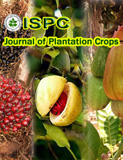Organic management of tuberous intercrops for resilience, higher yield and profit from coconut plantations: Insights from validation experiments in Kerala, India
DOI:
https://doi.org/10.25081/jpc.2023.v51.i1.8466Abstract
Fifteen on-farm experiments were conducted in tropical tuber crops intercropped in coconut gardens in Thiruvananthapuram, Kollam and Pathanamthitta districts, Kerala, during 2018-2021 for validation of organic production technologies. The validation experiments were performed under the aegis of the ICAR-Central Tuber Crops Research Institute, Thiruvananthapuram, in a project funded by the Coconut Development Board, Kochi, Kerala. Three treatments viz., T1: organic farming technology (OF), T2: POP recommendation (POP) and T3: farmer's practice (FP) were evaluated in cassava, elephant foot yam and greater yam intercropped with coconut. System productivity and profitability were worked out for the different treatments based on yield and income from coconut and tuber crops in the respective treatments. Pooled analysis indicated that the coconut yield under intercropping with tuber crops in organic mode was high by 7-13% in comparison to monocrop of coconut maintained by the farmers. Tuber yield under organic management was superior over POP by 14% and FP by 27%. On an average, the net income from coconut-tuber crop intercropping system under organic management was ₹ 2,36,133 ha-1, whereas it was ₹ 1,56,904 ha-1 in POP and ₹ 1,32,706 ha-1 in FP and significantly outperformed sole coconut (₹ 7,764 ha-1). Thus, the results indicated that organic management of coconut-tuber crop system offered resilience with higher system productivity and profitability.
Downloads
References
CDB. 2021. Coconut development board, Ministry of Agriculture and Farmers Welfare, Kochi, Kerala (coconut board.gov.in/Statistics.aspx)
GOI. 2021. Annual report 2020-2021. Department of Agriculture, Cooperation and Farmers' Welfare, Ministry of Agriculture and Farmers' Welfare, Government of India, New Delhi, 294 p.
Menon, S.K. and Nayar, T.V.R. 1978. Effect of intercropping with tuber crops in root (wilt) affected coconut garden. 416-424. In: Proceedings of Ist Plantation Crops Symposium (PLACROSYM I). PLACROSYM standing committee, Central Plantation Crops Research Institute, Kasaragod.
Nayar, T.V.R. and Suja, G. 2004. Production potential of root and tubers in multiple cropping systems involving plantation crops. Journal of Root Crops 30(2): 93-100.
Seena Radhakrishnan, A.R., Suja, G. and Sreekumar, J. 2021. How sustainable is organic management in cassava? Evidences from yield, soil quality, energetics and economics in the humid tropics of south India. Scientia Horticulturae 293: 110723, doi.org/10.1016/j.scienta.2021.110723.
Suja, G. 2005. Impact of nutrient management on biomass production and growth indices of white yam (Dioscorea rotundata Poir.) intercropped in a coconut plantation in South India. Tropical Agriculture 82(3): 173-182.
Suja, G. 2013. Comparison of tuber yield, nutritional quality and soil health under organic versus conventional production in tuberous vegetables. Indian Journal of Agricultural Sciences 83(11): 35–40.
Suja, G. and Jaganathan, D. 2021. Organic farming in tropical tuber crops: Prospects, challenges and strategies. Indian Farming 71(03): 02-08.
Suja, G. and Sreekumar, J. 2014. Implications of organic management on yield, tuber quality and soil health in yams in the humid tropics. International Journal of Plant Production 8(3): 291–309.
Suja, G., Byju, G., Jyothi, A.N., Veena, S.S. and Sreekumar, J. 2017. Yield, quality and soil health under organic vs conventional farming in taro. Scientia Horticulturae 218: 334-343.
Suja, G., Nair, V.M., Saraswathy, P. and Nayar, T.V.R. 2004. Response of white yam intercropped in coconut garden to organic manures, nitrogen and potassium. Journal of Plantation Crops 32(2): 21-27.
Suja, G., Sreekumar, J. and Jyothi, A.N. 2015. Organic Production of Aroids and Yams. Technical Bulletin Series No. 64, ICAR-Central Tuber Crops Research Institute, Thiruvananthapuram, Kerala, India, 131 p.
Suja, G., Sundaresan, S., Susan John, K., Sreekumar, J. and Misra, R.S. 2012. Higher yield, profit and soil quality from organic farming of elephant foot yam. Agronomy for Sustainable Development 32: 755–764. DOI:10.1007/s13593-011-0058-5.
Suja, G., Surekha, R., Subramanian, P., Jaganathan, D., Lintu Maria, C. and Rakhi K. Raj. 2020.Validation of organic management in cassava intercropped in coconut plantation in the humid coastal tropics of Kerala, India. Journal of Plantation Crops 48(1): 45-54.
Published
How to Cite
Issue
Section
Copyright (c) 2023 Journal of Plantation Crops

This work is licensed under a Creative Commons Attribution 4.0 International License.







 .
.